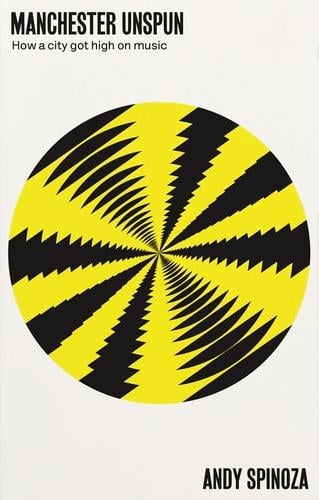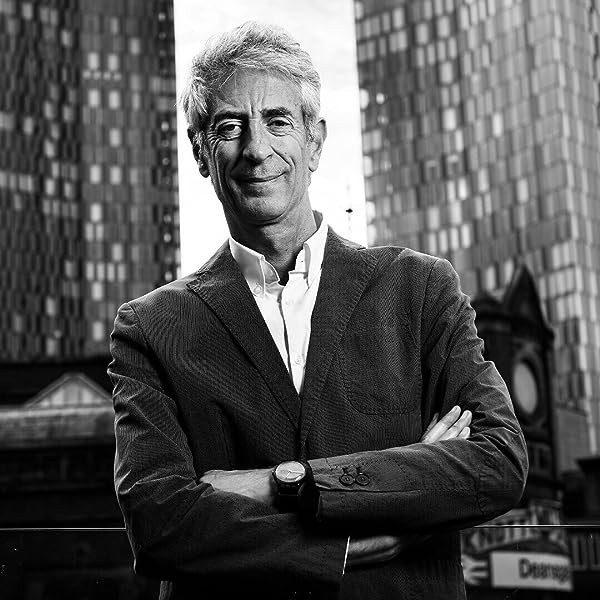Since moving to Manchester as a student back in 1979, Andy Spinonza has become one of the most respected names within Manchester’s now flourishing cultural scene.
In his book, Manchester Unspun, Spinoza chronicles the city’s transformation from a landscape still reeling from the Second World War to the skyscraper-lined international destination that we recognise today.
With the book’s imminent paperback release, we caught up with Andy to discuss the inspirations behind the book, his favourite spots in the city and Manchester’s unlikely journey throughout the last 40 years.

What inspired you to write the book?
Immortality. When I’m dead, I hope this book will be being read, and still entertaining people. After all, it’s a serious history but with jokes and I wanted to make it as fun to read as possible. In the future, whether it’s twenty, 50 or 100 years’ time, people will want to understand how Manchester went from a basket case to the exemplar of urban resurrection.
What were the cultural forces? How did the deceptive politics play out? Who were the key players? Why did this change happen here? What is so special about Manchester, compared to the other regional cities where very little has changed? Unspun explains it all, but I would never claim it to be THE story. It’s my story, my lived experience. And my time here – from the post-punk city in 1979 to the 2020 pandemic – seemed the perfect bookends to this remarkable 40-year journey Manchester has been on.
Who is the book for?
Anyone who has lived, worked, studied or visited in Manchester and been captivated by its intellectual and physical energy, its indefatigable entrepreneurialism and its relentless production of popular culture which has left its mark on the world, from Europe and the US to Asia and Australia.
Manchester’s music has carried notions and images of it everywhere. I’ve never been to Los Angeles, but I’ve read books about its role as a movie production centre, so similarly, even people who have never been here, but have a version of Manchester in their heads from their record collections and other influences like football and celebrities, will find some things that reinforce their image – but also many things that will surprise them.
What’s been the biggest change you’ve seen during your forty-year career in Manchester?
The total and mind-blowing change in the city centre. I came to Manchester University as an 18-year-old in 1979. Back then just a few hundred people lived in town and I was one of them. Look at it now. Research I had done for the book puts central Manchester’s population today at 75,000. You can see the towers springing up, the speed of change is remarkable – over 50 towers now and another 50 on their way by 2030.
At the end of the 1970s, Manchester seemed to be sliding into the dustbin of history. Today the city is an international destination. So the book is an account of how the city went from being the proverbial dirty old town to today’s skyscraper city. After ten years in journalism with City Life and the Manchester Evening News, as a publicist, I worked with the city council and the big property developers, so I’ve had a front-row seat for over forty years on the transformation.
Where are some of your favourite haunts in Manchester?
Gorilla, Yes and Band on the Wall for small gigs, also the tiny Academy 3 at the university. New Century has amazing sound quality and has raised the standard. For food, I like sitting at the bar at Cicchetti off Deansgate and enjoying a Sicilian fish stew and a beer. Or soup noodle in Chinatown. For a pint, the Eagle Inn off Trinity Way or the evergreen Peveril of the Peak. But there are so many new places opening, I’ll never get around them all. For wandering and cycling, the urban edgelands of the Irk Valley and Castelfield Pomona are always intriguing.
What do you hope people take away from reading the book?
That they’ve read the story of a city’s reinvention from the inside, leaving them jaw-droppingly enlightened at how the levers of power have been worked in the nation’s most culturally influential city. And how Manchester’s ‘suits’ – the politicians and business leaders – have weaponised homegrown culture to build a new cityscape from the ruins of de-industrialisation. I hope to make people re-think how they perceive the city in light of what they’ve discovered from the book.
To mark the paperback release of Manchester Unspun, we’ve got a copy of the book to give away. Simply fill in the form below to be in with the chance of winning.
Competition form
Manchester Wire competition entry form
T&Cs: Applicants must be 18+, no cash alternative available, decision is final, winner will be randomly picked by MCR Wire, the winner will arrange their offer with Manchester Wire. Competition closing date is Fri 17 Nov, 00:01am
- Words:
- Ruth Allan
- Published on:
- Tue 7 Nov 2023
